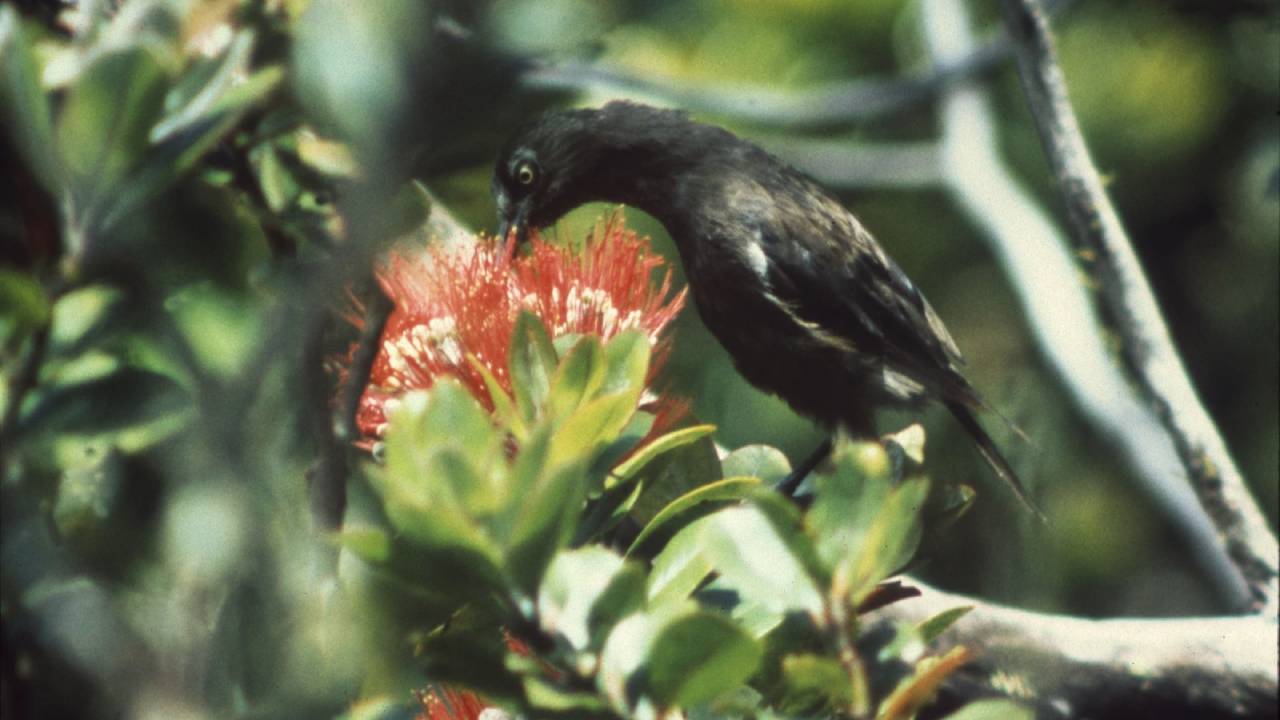Hawaiʻi, renowned for its rich biodiversity and endemic species, has been home to unique creatures found nowhere else on Earth. However, the story of the Kauaʻi ʻōʻō, a small and beautiful bird that once inhabited the rainforests of Kauaʻi, serves as a poignant reminder of how human intervention can devastate the most delicate ecosystems. Most heartbreakingly, the final song of this remarkable creature was recorded, preserving its voice forever.
The Life and Habitat of the Kauaʻi ʻōʻō

The Kauaʻi ʻōʻō was more than just a bird; it was an integral part of Hawaiʻi’s ecosystem. Nestled within the lush forests of Kauaʻi, often called the “Garden Island,” the bird played a vital role in pollination and seed dispersal, maintaining the delicate balance of the island’s unique environment. It was also deeply rooted in Hawaiian culture, symbolizing peace and harmony, and was considered sacred by native Hawaiians.
Dense forests, cascading waterfalls, and vibrant vegetation provided an ideal habitat for the Kauaʻi ʻōʻō. However, the introduction of non-native species such as rats and feral cats, coupled with rapid urbanization, deforestation, and climate change, drastically altered this environment. These factors, along with diseases carried by invasive species, caused a sharp decline in the bird’s population.
The Path to Extinction

By the mid-20th century, the Kauaʻi ʻōʻō was critically endangered. The last confirmed sighting occurred in 1987 when a solitary male was observed and recorded, its mournful song echoing through the forest for the final time. Despite extensive searches and conservation efforts, no other individuals were found, leading to the conclusion that the species had become extinct.
The extinction was not merely the loss of a species but also a cultural and ecological tragedy. Its disappearance left a void in the ecosystem, disrupting natural processes of pollination and seed dispersal. Furthermore, its loss represents a spiritual and cultural blow to the Hawaiian people, who held the bird in high regard.
The extinction of the Kauaʻi ʻōʻō highlights the broader issue of species decline in Hawaiʻi, often referred to as the “extinction capital of the world.” Many of Hawaiʻi’s bird species are now on the brink of extinction due to similar threats, including habitat destruction, invasive species, and climate change. The tragic story has inspired renewed efforts to protect the remaining bird species in Hawaiʻi. Conservation initiatives now focus on habitat restoration, predator control, and breeding programs to prevent further losses.
The Last Song: A Haunting and Sad Recording

The last known sighting of the Kauaʻi ʻōʻō occurred in the 1980s, and a recording from 1987 captures the song of the final known male. In this recording, the solitary bird can be heard calling in vain for a mate that would never come. The song is hauntingly melancholic, as if expressing its loneliness.
Islands, with their unique biodiversity, are home to species found nowhere else, making them especially vulnerable to extinction. The Kauaʻi ʻōʻō, with its distinctive yellow leg feathers, stands as a somber testament to how habitat loss, disease, and invasive predators can wipe out entire species.
The Legacy of the Kauaʻi ʻōʻō

Though the Kauaʻi ʻōʻō is no longer with us, its legacy endures. The bird has become a significant symbol in the fight to conserve native species on the islands. Artists, writers, and musicians continue to draw inspiration from the Kauaʻi ʻōʻō, ensuring its story remains a poignant reminder of what has been lost and what can still be saved.
Reflecting on its the extinction reminds us of our responsibility to act decisively to protect the natural world. Lessons learned from the loss of this beautiful bird can guide future conservation efforts and inspire a deeper commitment to preserving the rich tapestry of life on Earth.
Listening to the last song of the Kauaʻi ʻōʻō not only connects us to a past that no longer exists but also serves as an urgent call to action to protect the species we can still save. Below, you can hear the recording of the Kauaʻi ʻōʻō’s final song.
Reference:
- Birds of the World/Kauai Oo. Link.

